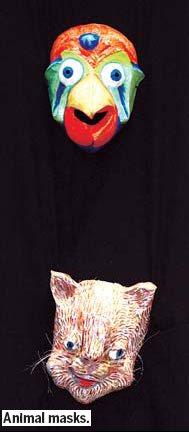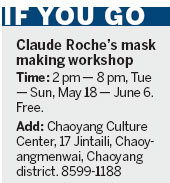
|
French artist Claude Roche (second from left) and his students pose for photo with their hand-made masks. ZOU HONG / CHINA DAILY |
With more than 40 years of experience, Claude Roche hopes to get new inspiration in Beijing
Michal Graczyk and his girlfriend feel a sense of pride as they use wooden tools to tease bizarre faces from the clay in front of them.
While their clay faces start to come to life, others in the room paste layers of newspaper onto forms and start to make shapes that will eventually also be bright masks.
They are among 10 people taking part in a session with a French teacher and artist and they are loving the experience, despite the clay spots and glue all over their hands and faces.
"I like making masks by using waste materials that can be found in the garbage bin," said Claude Roche, the renowned French mask maker who teaches the session.

He is also responsible for the 46 masks that hang on black cloth backdrops from the walls of the Chaoyang Culture Center where the classes take place between 2 pm and 8 pm from May 18 to June 6.
"Masks are not sculpture nor are they portraits," Roche tells his students. "They can only co-exist with their wearers."
Roche guides the class on how to measure the distance between the cheekbones, between the chin and the forehead, and between the ear and the nose.
He also gives a detailed demonstration on how to mould clay into a mask, and how to paste brown paper and waste newspaper onto the clay form using a glue he made out of wheat flour.
The 65-year-old artist tells the class that the mask is one of the most widely used objects in human history and something that has contributed significantly to the development of civilization.
"What is behind the mask is ecology and humanity," says Roche, who has made thousands of masks in a career lasting more than 40 years.
The Frenchman first learned how to make masks from Russian artist Cyril Dives in 1967. The process he learned initially was complex and he could spend more than a month on making one exquisite mask.
Two years later, Roche went to New York and worked with the Bread and Puppets Theater, which was famous at the time for its plays about sensitive political issues such as the Vietnam War.
There, he learned new techniques and found out how to finish a mask in just one day.
"It was the time when I realized the effectiveness of a mask had little to do with its fine quality," Roche recalls. "A roughly made and painted mask could be more touching."
He moved to Boston and established his own theater - The Black Wheat Theater - in 1971. Four years later, he went back to the south of France and continued his theater work there.
"Wearing a mask is like dealing with the extension of the universe," says the mask master, who has produced more than 30 mask plays. "It doesn't tell the character of a specific person but represents a certain type in the social society."
He said he finds it interesting that different wearers and people using different body language can give a mask many different meanings.
"A mask with a wide-open mouth, for example, could be interpreted as screaming but it also might be seen as singing," Roche explained with his eyes twinkling behind his glasses.
He lays his students' newspaper masks in a line to wait for them to dry prior to supervising the students painting them in the next session.
Graczyk and his girlfriend take a look at the masks they were working on with satisfaction.

Graczyk, who moved to Beijing from Poland one and a half years ago, said he got a lot out of the workshops.
"It was fun. I'll definitely make more masks in the future," the 27-year-old said as he looked approvingly at his mask's huge nose.
Zhu Jinghong, who was in her third workshop, said she wanted to make her mask perfect.
"I brought my husband here last Tuesday. It was his birthday," said the 41-year-old TV producer. "We have some very good memories of that day and also, two funny masks."
Roche said he still loves making masks but also gets a lot of fun out of meeting people at the workshops.
"I enjoy the interaction and discussion with my students," said Roche, whose workshop is conducted in Chinese, English, and French.
"They are creative and so eager to learn."
After the mask making workshops and their accompanying exhibition are over on June 6, the artist hopes to take part in some exchange programs so he can remain in China for a while longer to "absorb new inspirations", and go on "spreading the seeds of mask making".
|
Michal Graczyk (right) and his girlfriend learn to shape mask from French artist Claude Roche. |